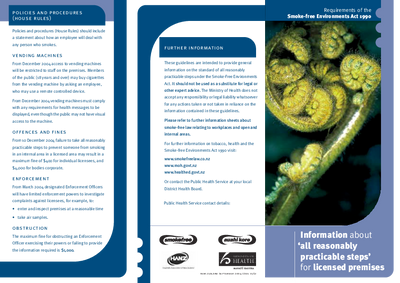Information about "All Reasonably Practicable Steps" for Licensed Premises - HE1562

Requirements of changes to the Smoke-free Environments Act 1990. Information for licensees covering an explanation of 'all reasonably practical steps' to ensure that licensed premises remain smokefree, guidelines for compliance, and offences and fines.
The full resource:
Requirements of the Smoke-free Environments Act 1990
Information for licensees covering:
- an explanation of ‘all reasonably practicable steps’
- guidelines for compliance
- offences and fines.
Three-quarters of New Zealanders do not smoke, but many are exposed to the significant health risks of second-hand smoke. The Smoke-free Environments Amendment Act 2003 (the Act) extends the protections for workers, volunteers and the public, particularly against exposure to second-hand smoke. The intention is to send a positive message about a smoke-free/auahi kore lifestyle being both desirable and the norm.
Key areas for licensed premises
From 10 December 2004, the licensee of any licensed premises will be required to take ‘all reasonably practicable steps’ to ensure that no person smokes on their premises. For the purposes of the Act, all reasonably practicable steps are all the steps that a reasonable and prudent person would take in the circumstances. A failure to take such steps will be a breach of the law under the Smoke-free Environments Act 1990.
There are some parallels between the steps that licensees will be required to take under the Act from December 2004 onwards, and other sorts of measures currently expected of licensees and duty managers under the Sale of Liquor Act 1989. Smoking in prohibited areas will be treated like any other form of inappropriate behaviour on licensed premises and intervention will be necessary.
Plan
Every premise will need to have a plan – a set of procedures for intervention to deal with an offending smoker. The plan should be tailored to the individual premises.
Where a patron smokes in a prohibited area, intervention by staff and/or management will be required. The fact that intervention may be difficult or risky does not lessen the licensee’s responsibility to intervene. Rather, such factors emphasise the need for a safe and appropriate plan that provides a clear and tangible set of procedures for staff to follow in any given situation, and the need for training for all staff on the plan.
The plan should include the following sorts of procedures:
- door staff requiring a patron entering the premises whilst smoking to put out their cigarettes before they can enter
- management and staff requiring a patron who is smoking to stop smoking and ensuring that they do so if they wish to remain inside
- management and staff requiring a patron who refuses to stop smoking when asked to do so to leave the premises and ensuring that they do leave or stop smoking if they wish to remain.
Ashtrays
All ashtrays should be removed from all internal areas.
Ashtrays or sandboxes should be provided at all the principal entrances to the premises.
Signage
Smoke-free signage stating that there is a total prohibition on smoking inside the premises should be clearly displayed at all the principal entrances to the premises.
Smoke-free signage should also be clearly displayed in all internal areas. If there are any open areas on the premises where smoking is permitted, such areas should be identified on the signs.
Training
All staff should receive training on the plan for dealing with offending smokers.
New staff should receive training as part of initial induction procedures for the premises such as health and safety, and licensing responsibilities. All new staff should be trained and supervised by staff who have been trained on, and who are experienced in, dealing with the plan.
Regular staff training should reinforce the plan for existing staff on an on-going basis.
Policies and procedures (House rules)
Policies and procedures (House Rules) should include a statement about how an employee will deal with any person who smokes.
Vending machines
From December 2004 access to vending machines will be restricted to staff on the premises. Members of the public (18 years and over) may buy cigarettes from the vending machine by asking an employee, who may use a remote controlled device.
From December 2004 vending machines must comply with any requirements for health messages to be displayed, even though the public may not have visual access to the machine.
Offences and fines
From 10 December 2004 failure to take all reasonably practicable steps to prevent someone from smoking in an internal area in a licensed area may result in a maximum fine of $400 for individual licensees, and $4,000 for bodies corporate.
Enforcement
From March 2004 designated Enforcement Officers will have limited enforcement powers to investigate complaints against licensees, for example, to:
- enter and inspect premises at a reasonable time
- take air samples.
Obstruction
The maximum fine for obstructing an Enforcement Officer exercising their powers or failing to provide the information required is $1,000.
Further information
These guidelines are intended to provide general information on the standard of all reasonably practicable steps under the Smoke-Free Environments Act. It should not be used as a substitute for legal or other expert advice. The Ministry of Health does not accept any responsibility or legal liability whatsoever for any actions taken or not taken in reliance on the information contained in these guidelines.
Please refer to further information sheets about smoke-free law relating to workplaces and open and internal areas.
For further information on tobacco, health and the Smoke-free Environments Act 1990 visit:
Or contact the Public Health Service at your local District Health Board.